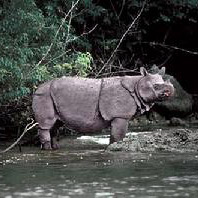Top 10 endangered species in 2010
WWF has had many successes in the past, rescuing species from the brink of extinction, but the increasing threats from deforestation, poaching and climate change are threatening to unravel some of our hard work – and we’re doing everything possible to make sure that doesn’t happen.
This selection is just 10 from a growing list of officially endangered species, with a reminder of some of the work we’re doing, with your support, to help them survive.
Tiger
 |
Sadly there’s also still a high demand for tiger skins, and body parts are used in traditional Asian medicine – all despite
international and national bans. We’re determined to halt unscrupulous and illegal trading so that the remaining tigers don’t go the way of their now-extinct Javan and Balinese relatives.
Climate change further complicates the picture, for instance causing the sea level rise that threatens the mangrove habitat of tigers in the Sundarbans of Bangladesh and India.
The upcoming Chinese Year of the Tiger, from February 2010, will mark an important period for tiger conservation – and we’ll continue to play a vital role, with bold new strategies for saving this magnificent big cat.
Javan rhinoceros
in the wild, in two separate populations – the largest one in Java and the other in Vietnam – making the Javan rhino one of the most endangered large mammals.
Like tigers, they’re highly prized for use in traditional Asian medicine, and their forest habitat has been systematically destroyed, mostly for farmland. We’ve been involved in protecting them since 1998, helping forest rangers increase patrols, surveying rhino populations and raising awareness of the rhinos’ importance to local communities.
Trained sniffer dogs have recently been used to search for traces of the extremely rare and endangered Vietnam population, of which no more than a dozen are thought to exist. The samples will be analysed to gauge the gender mix and whether this small group of Javan rhinos has a chance of survival.
Bluefin tuna
 |
A temporary ban on international trade would allow this overexploited fish to re-establish its numbers. That’s why WWF is calling on all countries who are members of CITES (the Convention on International Trade in Endangered Species of Wild Fauna and Flora) to protect this species at their next meeting in March.
We’d also encourage restaurants, chefs, retailers and consumers to stop serving, buying, selling, and eating bluefin tuna until this amazing species shows signs of recovery.
 0
0 







